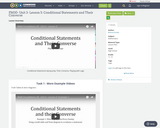
Conditional Statements & Their Converse. Playing with Logic
- Subject:
- Mathematics
- Material Type:
- Lesson Plan
- Author:
- Brenna Siroski
- Date Added:
- 04/02/2018

Conditional Statements & Their Converse. Playing with Logic
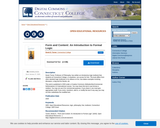
Derek Turner, Professor of Philosophy, has written an introductory logic textbook that students at Connecticut College, or anywhere, can access for free. The book differs from other standard logic textbooks in its reliance on fun, low-stakes examples involving dinosaurs, a dog and his friends, etc.
This work is published in 2020 under a Creative Commons AttributionNonCommercial-NoDerivatives 4.0 International License. You may share this text in any format or medium. You may not use it for commercial purposes. If you share it, you must give appropriate credit. If you remix, transform, add to, or modify the text in any way, you may not then redistribute the modified text.
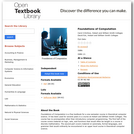
Foundations of Computation is a free textbook for a one-semester course in theoretical computer science. It has been used for several years in a course at Hobart and William Smith Colleges. The course has no prerequisites other than introductory computer programming. The first half of the course covers material on logic, sets, and functions that would often be taught in a course in discrete mathematics. The second part covers material on automata, formal languages, and grammar that would ordinarily be encountered in an upper level course in theoretical computer science.
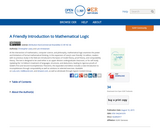
At the intersection of mathematics, computer science, and philosophy, mathematical logic examines the power and limitations of formal mathematical thinking. In this expansion of Leary’s user-friendly 1st edition, readers with no previous study in the field are introduced to the basics of model theory, proof theory, and computability theory. The text is designed to be used either in an upper division undergraduate classroom, or for self study. Updating the 1st Edition’s treatment of languages, structures, and deductions, leading to rigorous proofs of Gödel’s First and Second Incompleteness Theorems, the expanded 2nd Edition includes a new introduction to incompleteness through computability as well as solutions to selected exercises.
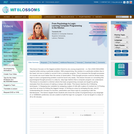
This lesson focuses on the biggest problem faced by any young programmer - i.e. the LOGIC BUILDING required while solving a particular problem. With programming, the solution to a particular problem lies in the head, but one is unable to convert it into a computer program. This is because the thought processes of a human are much faster than the sense of observation. If this thought process could be slowed down, logic to solve a programming problem could be found very easily. This lesson focuses on converting this psychological thought process in a step-by -step logic fashion that a computer program can understand. This lesson is recorded in a kitchen where the basic programming concepts are taught by giving examples from the process of making a mango milk shake. This lesson teaches the 4 following techniques: 1) Swapping two variables by swapping a glass of milk with a glass of crushed ice; 2) Finding max from an array by finding the biggest mango; 3) Sorting an array by arranging the jars; and 4) Understanding the concept of a function, parameters and return type by comparing it with the blender/juicer. The lesson targets those students who know the syntax of programming in any language (C or GWBASIC preferred), but are unable to build the logic for a program. It can be taught in a class of 45 to 50 minutes.
This lesson is also available in Mandarin Chinese.
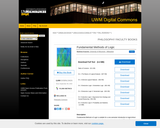
Fundamental Methods of Logic is suitable for a one-semester introduction to logic/critical reasoning course. It covers a variety of topics at an introductory level. Chapter One introduces basic notions, such as arguments and explanations, validity and soundness, deductive and inductive reasoning; it also covers basic analytical techniques, such as distinguishing premises from conclusions and diagramming arguments. Chapter Two discusses informal logical fallacies. Chapters Three and Four concern deductive logic, introducing the basics of Aristotelian and Sentential Logic, respectively. Chapter Five deals with analogical and causal reasoning, including a discussion of Mill's Methods. Chapter Six covers basic probability calculations, Bayesian inference, fundamental statistical concepts and techniques, and common statistical fallacies.
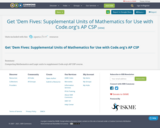
Computing Mathematics and Logic units to supplement Code.org's AP CSP course.

This course provides a challenging introduction to some of the central ideas of theoretical computer science. It attempts to present a vision of “computer science beyond computers”: that is, CS as a set of mathematical tools for understanding complex systems such as universes and minds. Beginning in antiquity—with Euclid’s algorithm and other ancient examples of computational thinking—the course will progress rapidly through propositional logic, Turing machines and computability, finite automata, Gödel’s theorems, efficient algorithms and reducibility, NP-completeness, the P versus NP problem, decision trees and other concrete computational models, the power of randomness, cryptography and one-way functions, computational theories of learning, interactive proofs, and quantum computing and the physical limits of computation. Class participation is essential, as the class will include discussion and debate about the implications of many of these ideas.

This course focuses on one particular aspect of the history of computing: the use of the computer as a scientific instrument. The electronic digital computer was invented to do science, and its applications range from physics to mathematics to biology to the humanities. What has been the impact of computing on the practice of science? Is the computer different from other scientific instruments? Is computer simulation a valid form of scientific experiment? Can computer models be viewed as surrogate theories? How does the computer change the way scientists approach the notions of proof, expertise, and discovery? No comprehensive history of scientific computing has yet been written. This seminar examines scientific articles, participants’ memoirs, and works by historians, sociologists, and anthropologists of science to provide multiple perspectives on the use of computers in diverse fields of physical, biological, and social sciences and the humanities. We explore how the computer transformed scientific practice, and how the culture of computing was influenced, in turn, by scientific applications.

This Wiki has been set up to help assist with learning FANUC's HandlingTool Operations and Programming. While the intention is to help the Erie Community College students of the Mechatronics program, it is freely available to anyone wishing to learn about the use of FANUC robots.

Inferring and Explaining is a book in practical epistemology. It examines the notion of evidence and assumes that good evidence is the essence of rational thinking. Evidence is the cornerstone of the natural, social, and behavioral sciences. But it is equally central to almost all academic pursuits and, perhaps most importantly, to the basic need to live an intelligent and reflective life.
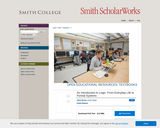
An introduction to the discipline of logic covering subjects from the structures of arguments, classical and modern logic, categorical and inductive inferences, to informal fallacies.
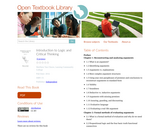
This is an introductory textbook in logic and critical thinking. The goal of the textbook is to provide the reader with a set of tools and skills that will enable them to identify and evaluate arguments. The book is intended for an introductory course that covers both formal and informal logic. As such, it is not a formal logic textbook, but is closer to what one would find marketed as a critical thinking textbook. Downloadable as a pdf file.
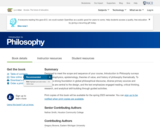
Designed to meet the scope and sequence of your course, Introduction to Philosophy surveys logic, metaphysics, epistemology, theories of value, and history of philosophy thematically. To provide a strong foundation in global philosophical discourse, diverse primary sources and examples are central to the design, and the text emphasizes engaged reading, critical thinking, research, and analytical skill-building through guided activities.
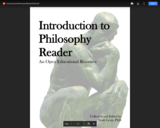
Philosophy (from Greek φιλοσοφία, philosophia, literally "love of wisdom") is the study of general and fundamental problems concerning matters such as existence, knowledge, values, reason, mind, and language. The term was probably coined by Pythagoras (c. 570 – c. 495 BC). Philosophical methods include questioning, critical discussion, rational argument and systematic presentation. Classic philosophical questions include: Is it possible to know anything and to prove it? What is most real? However, philosophers might also pose more practical and concrete questions such as: Is there a best way to live? Is it better to be just or unjust (if one can get away with it)? Do humans have free will?
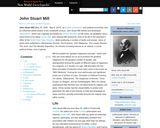
John Stuart Mill (May 20, 1806 - May 8, 1873), an English philosopher and political economist, was an influential liberal thinker of the nineteenth century. John Stuart Mill refined and developed utilitarianism, which was originally formulated by Jeremy Bentham (1748-1832), his godfather and a close friend of his father James Mill.
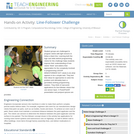
Student groups are challenged to program robots with light sensors to follow a black line. Learning both the logic and skills behind programming robots for this challenge helps students improve their understanding of how robots "think" and widens their appreciation for the complexity involved in programming LEGO® MINDSTORMS® NXT robots to do what appears to be a simple task. They test their ideas for approaches to solve the problem and ultimately learn a (provided) working programming solution. They think of real-world applications for line-follower robots that use sensor input. A PowerPoint® presentation and pre/post quizzes are provided.

This course begins with an introduction to the theory of computability, then proceeds to a detailed study of its most illustrious result: Kurt Gödel’s theorem that, for any system of true arithmetical statements we might propose as an axiomatic basis for proving truths of arithmetic, there will be some arithmetical statements that we can recognize as true even though they don’t follow from the system of axioms. In my opinion, which is widely shared, this is the most important single result in the entire history of logic, important not only on its own right but for the many applications of the technique by which it’s proved. We’ll discuss some of these applications, among them: Church’s theorem that there is no algorithm for deciding when a formula is valid in the predicate calculus; Tarski’s theorem that the set of true sentence of a language isn’t definable within that language; and Gödel’s second incompleteness theorem, which says that no consistent system of axioms can prove its own consistency.
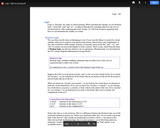
This chapter supplements David Lippman's Math In Society textbook.

This activity is intended as an exercise in deductive logic. The students perform a series of "experiments" in which they try to identify which predators eat which specific prey (Each predator eats one and only one prey).
The instructions are on the site. students may also click on the blue square to make the game full screen.
A worksheet is added for students to record their results. This also is an exercise in articulating the logic used in the study. (Most students have no trouble figuring out the relationships). Writing down their results and conclusions is a bit trickier. )
This has been used for community college classes. It can be used at lower levels such as high school or even middle school without the worksheet.